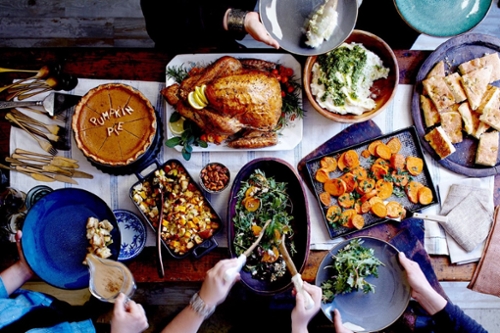How To Have Difficult Conversations Over the Holidays
November 25, 2020
- RCAH's CAPS counseling consultant, Victor Leon, and other RCAH-ers give advice on how to have safe, productive talks.
- Set your own boundaries and understand when it is appropriate to change the topic.
- Listening, relying on trusted people, offering empathy, and avoiding unsafe conversations are among the many recommendations.
Story and photo by Chrystel Lopez ’22
 The holiday season can be filled with the joy of twinkling lights, homemade cooking, and loved ones. But, it can also be filled with worry and dread. Now, in the midst of a global pandemic and post-election chicanery, even more so. Then mix in disagreements over racial injustice, police brutality, climate, gender and identity… and your family meal can turn sour fast.
The holiday season can be filled with the joy of twinkling lights, homemade cooking, and loved ones. But, it can also be filled with worry and dread. Now, in the midst of a global pandemic and post-election chicanery, even more so. Then mix in disagreements over racial injustice, police brutality, climate, gender and identity… and your family meal can turn sour fast.
MSU Counseling & Psychiatric Services (CAPS) counseling consultant Victor Leon recommends understanding one’s intent with the conversation before engaging. Asking yourself questions beforehand may help with this process.
“What message do I want to convey? What do I want them to hear? Is it more important to make your point, or maintain that relationship?” Leon suggested asking yourself. “These answers are going to vary from person to person, so it's important for folks to think about what their limits, boundaries, and goals are if they want to engage in these dialogues.”
Leon explained that it is important to end the conversation when it seems fit.
For some people, the conversation doesn’t need to begin in the first place.
“Some students may not feel safe or comfortable having these conversations, in which case, it is absolutely okay to abstain from them,” he noted.
It can help to change the topic of discussion to derail tension. Steer away from politics, news, and other divisive issues. Though these are important issues to bring to light, they don’t have to take place at the dinner table. Bring up your classes or cool shows that you’re watching. Find common ground with family members that keeps the conversation light. Remind people that you are here to connect with them, not to bump heads.
However, if one feels that a conversation is mandatory to have, it is important to practice patience with oneself and others.
RCAH’s Director of Student Affairs, Niki Rudolph, says that these discussions are not above proving yourself, but about having a worthwhile conversation.
“The disagreement is usually with someone I love, someone whom I want in my life, and I remind myself that I want them to demonstrate empathy for another,” Rudolph explained via email. “Therefore, I have to demonstrate empathy and understanding (not agreement) for them, and why they might think differently than me.”
It may be difficult to come from a place of love and caring, Rudolph said, which is why it is important to decide if talking will be useful or not.
Pamela Newsted, RCAH’s Academic Secretary, recommends giving others space to speak and show them that you are listening to encourage them to do the same.
“You may not be in agreement, but let them know you’ve heard them,” Newsted says. “When the other person feels that they have been heard, it’s surprising how it encourages them to also listen to your point of view.”
Ultimately, it may be difficult to relate to family members or to feel listened to. RCAH student Lia Bommarito ’22 suggests reaching out to the loved ones who historically have supported you in times like this.
“It’s important to rely on a larger support network that includes friends and roommates, not just your family,” Bommarito said.
Further Resources:
Article: Ask the Expert: Managing anxiety through the holiday season
Resources and help during a crisis: https://caps.msu.edu/emergency/index.html
The Residential College in the Arts and Humanities at Michigan State University is a unique living-learning community where students get the advantages of a small college liberal arts education and the opportunities of a major university. Students prepare for meaningful careers by examining critical issues through the lens of culture, the visual and performing arts, community engagement, literature, philosophy, history, writing, and social justice. RCAH’s 100% placement rate for graduates over the past seven years is the best at MSU. Visit rcah.msu.edu, email rcah@msu.edu, or call 517-355-0210.

